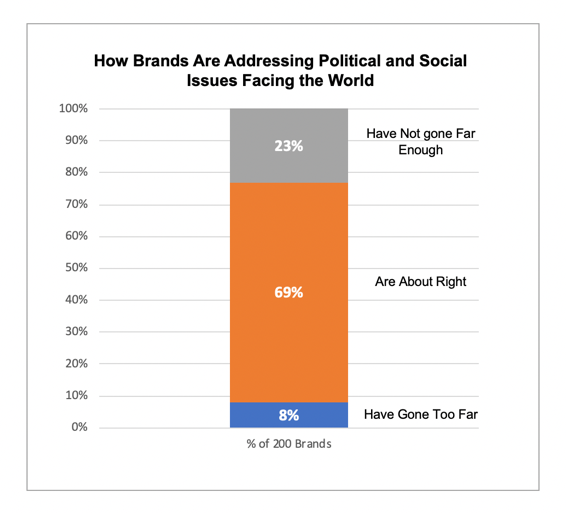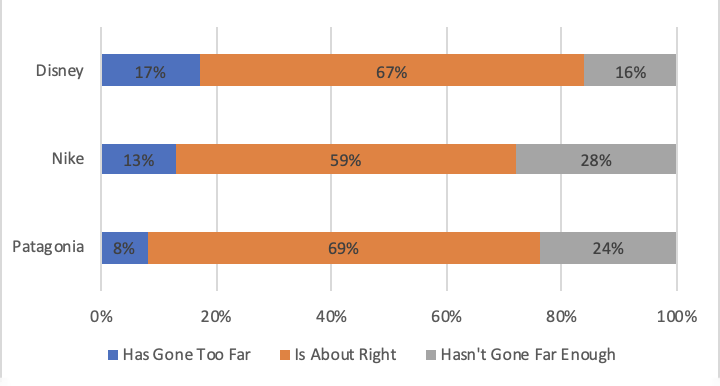Conventional wisdom says that brands taking a stand on social and political issues is generally a terrible idea. We hear things like “you’ll only end up alienating half the population by picking a side,” or “companies should serve shareholders, not social causes.” Mitch McConnel has been quoted as saying “My advice to the corporate CEOs of America is to stay out of politics. Don’t pick sides in these big fights.”
Perhaps this is not surprising since much of what’s been written about corporate social activism has focused on the pitfalls and failures. Remember Starbucks’ disastrous “race together” or Pepsi’s dreadful Kendall Jenner ad? The NFL seems to have pissed off just about everyone with its shifting stance on “taking a knee.”
New evidence suggests the tide has turned in 2022, and that consumers feel most companies are either getting activism right or are not going far enough with it.
You read that right, if anything the appetite from the public seems to be for more social and political activism from companies and brands, not less. My firm StrawberryFrog, together with leading market research firm Dynata, surveyed more than 5,000 consumers in the spring, asking them to rate over 200 brands on a range of topics including how they address social and political issues. The public indicated, in our Purpose Power Index study, that 69% of brands are “about right” in the way they are addressing political and societal issues facing the world, while 23% of brands “have not gone far enough.” Only 8% of brands were judged as “going too far” in addressing these issues.

Our data indicates that even some of the more controversial social activism brands are failing to see major backlash from the public. Consider brands like Patagonia with its “vote the a**holes out” campaign, Nike with its Colin Kaepernick “Dream Crazy” creative, and Disney which most recently took a stand against the “Don’t Say Gay” legislation in Florida.
Strong majorities of the public think these companies are either getting things right or need to go further, with only a small minority thinking they’ve gone too far. This means that, by alienating only a few who probably wouldn’t do business with them anyway, they’ve been able to be on the radar in culture, stand out and connect with people regarding something they care about.

One of the biggest reasons why consumers are supporting corporate activism is that companies have gotten better at it. Yes, there have been some blunders like the Pepsi and Starbucks examples mentioned earlier, but companies have also brought on experts, hired “Chief Purpose Officers,” and actively worked to combat purpose-washing and inauthenticity.
Social activism lessons
So, what are companies getting right? Here are two major lessons we’ve learned in activating purpose effectively with clients.
First and foremost, company social activism must have a clear connection to your underlying business. When the public understands why a social or political issue is germane to the priorities of your enterprise, they have a higher tendency to accept your stand, regardless of whether they completely agree with it.
A good example is Northwell Health (a client), a major hospital system that launched a national campaign this year to encourage discussion around gun and gun storage safety. The campaign, “It doesn’t kill to ask,” encourages parents to make sure guns are locked away in any environment including children. One of the reasons Northwell’s stand has been highly praised and received little backlash is because it’s easy to see a clear connection between the topic and Northwell’s mission of raising health. Gun violence has been the leading cause of death for children in America for the last two years.
Secondly, company social activism needs to come from a place of deeply held company values rather than partisan leaning. UPS is an example of a company that has successfully navigated hot button issues, taking values-driven stands while generally avoiding backlash by living its values.
Last year I spoke with UPS Chief Corporate Affairs Officer Laura Lane who told me, “I think why UPS has been successful in advocating for change, when I think about voter laws, when I think about changes in some of the health care mandates that are now coming out, we did it from that foundation of what really matters, by keeping politics out of it and acting based on our company values. We are neither red nor blue, we are brown.”
Why does the public seem to give brands so much leeway on these controversial issues, when social and political polarization are ripping our country apart in the public square?
Consumers aren’t dumb – they know that companies have always weighed in on things like political policies, but it was typically done out of sight by lobbyists. Now, we’re in an age of hyper-transparency and consumers prefer to know where you stand out in the open. They have some tolerance for stances that don’t totally match their own within reason, IF they make sense given your business reality.
Simply put, your silence on an issue can say more about you than speaking up. For today’s savvy and values-driven consumer, knowing where your company stands on important societal and political issues is better than not knowing.
Chip Walker is the head of strategy and a partner at StrawberryFrog and the coauthor along with Scott Goodson of “Activate Brand Purpose.” He is recognized for his expertise in brand creation and reinvention and has led the charge in transforming brands such as Goldman Sachs, Lexus, Bank of America, Jim Beam and Heineken. Walker is a frequent speaker at some of the branding world’s major events and his writing and opinions have appeared across marketing and consumer media.
Subscribe to SmartBrief’s free newsletter to get the latest marketing news and insights direct to your inbox.
